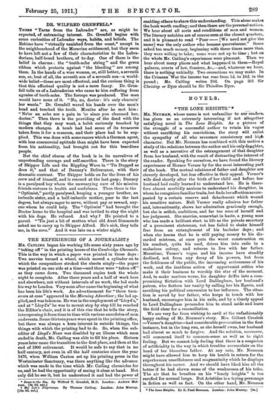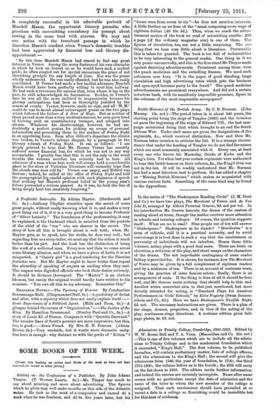NOVELS.
• rlib, LONE HEIGHTS." •
Mn. NEUMAN, whose name is not unfamiliar to our *readers, has given us an extremely interesting if not altogether satisfying novel in The Lone Heights. As a picture of the struggle of a successful author to retain his vogue without sacrificing his convictions, the story will enlist the sympathy of all who reverence consistency and high character. But Mr. Neuman has combined with this motive a study of the relations between the author and his only daughter, as well as a narrative of the estrangement of that daughter from her husband, with the result of distracting the interest of the reader. Speaking for ourselves, we have found the literary experiences of Horace Verner by far the most interesting part of the book. The mutual relations of father and daughter are cleverly developed, but less effective in their appeal. Verner's wife died shortly after the birth of her child and before her husband had really learned to understand her. He is there- fore almost morbidly anxious to understand his daughter, in whom he recognises familiar traits, but finds her affection accom- panied by a certain reserve and detachment which wound his sensitive nature. Nell Verner really admires her father and, intermittently, shows her admiration graciously enough, but she is selfish, ambitious, and far too sure of herself and her judgment. She marries, somewhat in haste, a young man who has made a brilliant start in life as the private secretary of a prominent statesman, but has failed to shake himself free from an entanglement of his bachelor days ; and when she learns that he is still paying money to his dis- carded mistress, at once puts the worst construction on his conduct, quits his roof, drives him into exile in a malarious colony, and returns to live with her father. Meantime, Verner's vogue and his income have steadily declined, not from any decay of his powers, but from the fickleness of the public, the increasing seriousness of his work, and the insidious action of opportunist critics who make it their business to worship the star of the moment. And, to make matters worse, his daughter drifts into a com- promising flirtation with Lord Dallingham, her husband's patron, who flatters her vanity by calling her his Egeria, and ascribing his political conversion to her influence. The situa- tion is saved by her father, who keeps in touch with her husband, encourages him in his exile, and by a timely appeal to Lord Dallingham persuades him to stand aside and leave the field clear for a reconciliation.
We are very far from wishing to cavil at the unfashionably happy ending of Mr. Neuman's story. Mrs. Gilbert Creslett —Verner's daughter—had considerable provocation in the first instance, but in the long run, as she herself owns, her husband had almost as much to forgive. And the solution, moreover, will commend itself to common-sense as well as to right feeling. But we cannot help feeling that there is a suspicion of artificiality in the way in which troubles accumulate on the head of her blameless father. At any rate, Mr. Neuman might have allowed him to keep his health in return for the superhuman unselfishness and magnanimity which he displays throughout his career. And we should have liked him all the better if be had shown some of the weaknesses of his tribe. The air that he breathes on his " lonely heights " is too rarefied for normal lungs. But Aristides is a trying personage in fiction as well as fact. On the other band, Mr. Neuman
• The Loss Heights. By B. Paul Neuman. Loudon : John Murray. [es.]
is completely successful in his admirable portrait of Mandell Mason, the opportunist literary parasite, who practises with unremitting consistency his precept about rowing in the same boat with success. We may end our notice with the trenchant passage in which he ' describes Mason's conduct when Verner's 'domestic troubles bad been aggravated by financial loss and literary dis- appointment :—
" By this time Mandell Mason had ceased to feel any great interest in Verner. Among the many features of his own character in which he took an honest or, as he would have said, a modest pride, he often singled out for special encomium the grace of not cherishing grudges for any length- of time. Nor was the praise wholly undeserved. He was easily offended, but he was also easily conciliated. If Verner had made a few tactful advances, Mandell Mason would have been perfectly willing to meet him halfway. He had such a reverence for success that, even where it lay in the past, he still acknowledged its fascination. Besides, in Verner's ease he was all the more inclined to raag,n Anima), because his gloomy anticipations had been so thoroughly justified by the course of events. Verner, however, made no sign, and all M. M.' could do was to lavish almost extravagant praise on the two plays which followed the failure of A Door of Hope. But as neither of them proved more than a very moderate success, he soon grew tired of blowing such an unsatisfactory trumpet, and relapsed into silence. Whatever his shortcomings, however, he had un- doubtedly a perfect genius for picking up scraps of personal information and presenting them to the readers of Friday Night in an appetizing form. Soon after Gilbert's departure the silence was broken, to Verner's intense disgust, by a paragraph in the literary column of Friday Night. It ran as follows : I am deeply grieved to hear that Mr. Horace Verner has recently suffered severe financial loss, for which he was not in any way accountable. I greatly fear that this is not the only or the worst trouble the veteran novelist has recently had to bear. All admirers of a man whose best work will always hold a considerable place in the story of Victorian literature will earnestly hope that the clouds may soon roll by.' Verner was angry, and Eldred was furious ; indeed, he called at the office of Friday Night and told the paragraphist his candid opinion with such plainness of speech that nothing but adason's profound belief in the young man's future prevented a serious quarreL As it was, he took the line of being deeply hurt but resolutely forgiving."







































 Previous page
Previous page